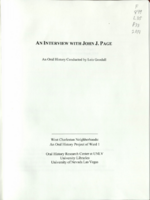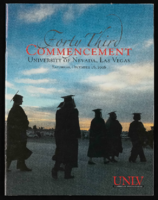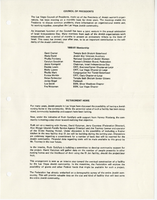Search the Special Collections and Archives Portal
Search Results

Interview with Benjamin Clinton Diven, March 10, 2004
Date
Archival Collection
Description
Text

Ashley Vargas interview, October 30, 2018: transcript
Date
Archival Collection
Description
Interviewed by Laurents Banuelos. Elsa Lopez and Claytee White also participate in the questioning. Ashley Vargas, also know by her stage name Ms. Aye Vee is a Las Vegas native born and raised. She has received notoriety in the Las Vegas valley for her raw story telling and poetry. Vargas identifies as an Afro-Latina Puerto Rican. She spent her childhood growing up on the Eastside. She vividly remembers having to navigate several spaces in order to survive the rough neighbors she was in. Today, Vargas uses her poetry to communicate her experiences and set ups workshops to help cultivate young up and coming writers. Please note the following disclaimer: This interview contains language that some may find offensive.
Text

Transcript of interview with Don Ross by Barbara Tabach, February 15, 2017
Date
Archival Collection
Description
At the time of this interview, Don Ross has devoted nearly four inspirational decades of his life in the hotel and hospitality industry. In December 1987, at the age of 29, he accepted a position with Caesars and is now the Vice President of Catering, Conventions & Events for Caesars Palace Las Vegas. Don shares personal stories that lead to his “Don-mode” of providing a high level of customer service. From experiences with his grandparents to an extraordinary upbringing in his parents’ business, Green Chimneys, in Brewster, New York, Don received a surprisingly well-rounded educational foundation. As Don discovered his natural innate ability to serve others in the hospitality industry, he thrived and has never looked back. In recent years, his leadership talents and giving nature have been honored. In 2009, he was one of three distinguished industry executives recognized for their exceptional contributions to the hospitality industry as an “Industry Executive of the Year” during UNLV Harrah College of Hotel Administration’s 5th Annual Vallen Dinner of Distinction. Over the years, he has been honored for his work with Opportunity Village, his Jewish community involvement, and his continued work with Green Chimneys among many other organizations and causes.
Text

Transcript of interview with Martin, Linda, and Robert Wilner by Barbara Tabach, May 10 & 24, 2016
Date
Archival Collection
Description
During the early 1970s, the boom of Las Vegas included many single people following family who had already settled there. Among those was Martin (Marty) Wilner. Marty?s parents were Leo and Mickey Wilner. Leo moved to Las Vegas to become the Executive Director at Temple Beth Sholom, the only synagogue in town. Marty, who was born and raised in California, had recently earned his doctorate in psychology at the University of Houston. He became a counselor at UNLV. Not long after, Marty met Linda at a Jewish Singles event. Linda was a divorced, mother of three children, who had moved from California to find comfort in living near her parents. Robert Wilner is one of her three children. He was adopted by Marty and works with his mother in the real estate business. In this interview, they recall together the Las Vegas of the 1970s. For Robert, he remembers his bar mitzvah, and growing up with Jewish friends under the careful eye of his grandparents. As an adult, he has enjoyed a successful career as a real estate agents working with his mother. For Linda, the success of real estate was being part of one of the most robust housing markets in the country. She and Robert recall an extensive list of visionaries who developed the valley, as well as the inherent challenges of water, unions and maintaining their high level of ethics.
Text

Transcript of interview with Bruce Isaacson by Barbara Tabach, March 24, 2017
Date
Archival Collection
Description
Bruce Isaacson was born in 1956 in Castro Valley, California to Betty Griffin and Bernard Isaacson, and spent his childhood in Oakland. He received his bachelor?s degree from Claremont McKenna College with majors in economics as well as drama, and continued studying for his Masters of Business Administration at Dartmouth College. After receiving his MBA, Isaacson started a career in finance, focusing on mergers and acquisitions. In 1995, he moved to Las Vegas to pursue a real estate career alongside his father. In June 2015, Isaacson became Clark Country?s first poet laureate to encourage poetry as an art form in Southern Nevada. Although Isaacson began writing poetry at a young age, he wanted to develop his craft further. So he attended Brooklyn College for a Masters of Fine Arts and studied with famed poet Allen Ginsberg. Isaacson is known in the San Francisco Bay Area as organizer and poet in the Cafe Babar readings in the 1980s. He is also a co-founder of Zeitgeist Press, where he remains publisher and co-editor. In this interview, Isaacson discusses his childhood and how he maneuvered his career path from finance into poetry. He talks about applying for and serving as the county?s first poet laureate, and describes the programing he?s started in this capacity. Isaacson also speaks about his earlier involvement with Bay Area poetry scene as well as the impact of his Jewish upbringing on his life and his art.
Text

Transcript of interview with Dr. Ray and Linda Rawson by Claytee White, October 30, 2009 and November 13, 2009
Date
Archival Collection
Description
Raymond Rawson's life started in the rural Utah community of Sandy in 1940. His family moved around in what he describes as a scene from John Steinbeck's The Grapes of Wrath. By the age of 10, the family settled in Las Vegas, which had a population of around 35,000. He attended Fifth Street Grammar School, Las Vegas High School, was a member of UNLV's first graduating class, and eventually became a dentist. In this interview, he reflects on his experiences of growing up in Las Vegas, the hardships of difficult economic eras, and his professional accomplishments in the field of dentistry, including actively advocating the creation of UNLV School of Dental Medicine. Ray also became a community leader. He served in the Nevada State Legislature from 1985 to 2001. He talks about his relationship with long-time legislator Joe Neal. Education and access to healthcare were among the issues that Ray championed and he shares his observations of these issues. In 2009, he was appointe
Text

Transcript of interview with John Page by Lois Goodall, April 16, 2014
Date
Archival Collection
Description
John J. Page attended 13 schools before graduating from high school in the Ozark Hill Country of Oklahoma. Although he engaged in no combat, he was drafted into military after completing two years of college at the University of Oklahoma in Norman, Oklahoma. After his discharge from the U.S. Air Force, he helped his wife, Reitha, finish the credits she needed to complete her degree, and he then worked to complete his in Norman. Following his graduation, the couple relocated to Las Vegas in February 1959, when Reitha found a job at Washington Elementary School. In Las Vegas John completed his practice teaching under master teacher Lamar Terry at Twin Lakes Elementary School and under supervision of Dr. Holbert Hendrix at the University of Nevada, Las Vegas. John held his first teaching assignment, fifth grade at West Charleston Elementary School (later called Howard Wasden Elementary School), for 27 years before transferring with his principal to Helen Marie Smith Elementary School. For a time John and Reitha rented a small house at the comer of Bonanza Road and First Street that was owned by entertainer Horace Heidt. They bought their first house, a Pardee Park Home one block north of Tom Williams Elementary School in North Las Vegas, because Reitha taught there, and she and the children could walk to school together. In 1973 they bought their current house on El Cortez Avenue in the Westleigh tract. Page not only worked in Ward 1 for 27 years of his 36-year teaching career (1959-1995); he and his family also lived in Ward 1 for more than forty years. As a teacher in the school that served the wealthiest Las Vegas families, Page witnessed the many ways that generous donations of time, money, and talent matter to schools, students, and teachers. As an early resident of Westleigh tract, Page saw dramatic changes to the area's built environment. And as a longtime educator, Page observed several cycles of experimental instmctional techniques and philosophies.
Text

University of Nevada, Las Vegas (UNLV) 43rd commencement program
Date
Archival Collection
Description
Commencement program from University of Nevada, Las Vegas Commencement Programs and Graduation Lists (UA-00115).
Text

Newspaper clipping, Nevada lawmakers study bills to curb operations of agency, Wall Street Journal, March 8, 1957
Date
Archival Collection
Description
The state legislature was holding hearings on a bill that would replace restrictions on the water district that would endanger their outstanding bond issue.
Text

